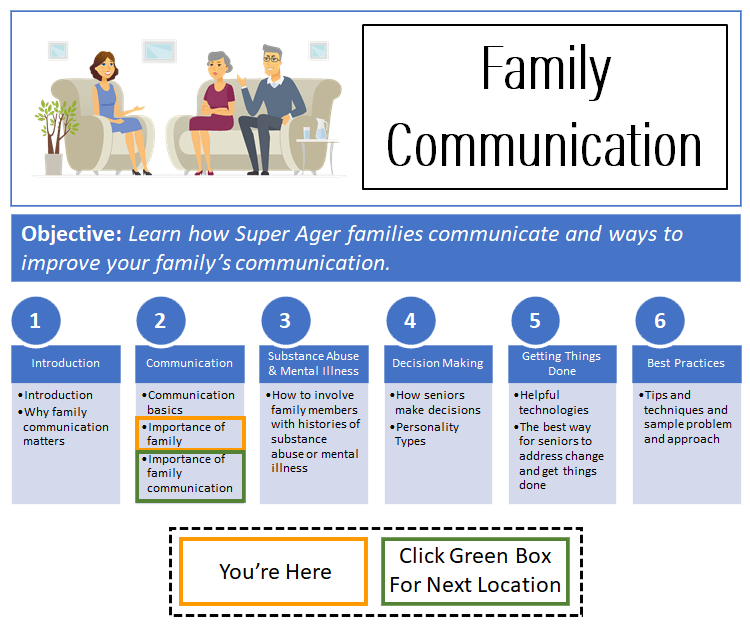Importance of Family
Click here to see what's on this page.
Sometimes it’s easy to take the importance of family for granted. But we shouldn’t. Families are society’s oldest and most resilient institution. From the beginning of the human experience, people have formed families. This grouping allows the members to find emotional, physical, and communal support. Consequently, it’s the foundational support mechanism for children. It’s where children are first loved and socialized. Furthermore, parents make decisions about careers, housing, and geographic location to optimize the welfare of their children.

In time of test, family is best.
Burmese Proverb
Where parents choose to raise their children often becomes the geographic foundation for parents even after their children leave home. Parents are members of faith-based organizations, they volunteer in their community and they serve in positions that support their community. Parents make roots around their decisions to best raise their children.
Family Values Create Safe Streets
Families make up societies. As such, they often focus on values and aspirations consistent with those of families. These include things like safe streets, good schools, and appealing infrastructure, which in turn, support what’s important to companies. The jobs that companies offer to contribute to make families stronger.
This focus on communities also supports seniors. Creating infrastructure and networks that support children and companies create components that are suited for helping Agers. Meeting halls, support groups, medical practitioners, lots of housing options, and an abundance of volunteers create an ecosystem easily adjusted and tapped for senior related projects.
Find family environments and you’re likely to find hospitals, doctors, entertainment venues, housing options, churches, community centers and people willing to volunteer. This combination of infrastructure, people and community make it easier for Agers and their families to manage aging related care.
Politicians Pay Attention To Family Communities
Policy makers have noticed. Many senior-related health programs start in areas with good existing infrastructure. Funds for senior care go first to areas with senior centers, trained health care providers, transportation options, and an abundance of senior services.
Over time funds for senior programs get sent to more rural and less developed areas. But usually only after they’ve been proven in areas with existing infrastructure. And they generally get funded through existing infrastructure in rural areas. This might include hospitals, nursing homes and faith-based organizations. The lesson is that Agers living in the right place get access to more senior services.
Why Families Are Important
In addition to community and community services that support families, research suggests that family interactions, in and of themselves, are critically important. For example, the American Association of Retired Persons (AARP) found that 90 percent of people over 50 said family plays an extremely or very important role in their lives. Moreover, these findings were consistent across all types of families. For example, whether married, divorced, no kids, lots of kids, no siblings, lots of siblings, living parents, or deceased parents, everyone ranked family as extremely important.
When asked what makes family important the responses fell into areas like: someone has my back; friendship; sharing family memories; communicating regularly; staying up to date on important events like weddings, deaths, graduations and births; and spending time together.
There is also a fair amount of research that examines how different parts of the brain work that shows observation and imitation of emotional expressions elicit activity in the brain. These areas include the inferior frontal cortex, the anterior insula, and the amygdala. These areas are also linked to empathy and interpersonal competence. These, in turn, have been shown to link most closely to family members. This suggests that in advanced old age, when our brains have disintegrated, our existing memories and ability to respond may be deeply tied to our family and memories of family.
Critic of Families
There are critics of families. Some researchers argue the family is weak and always has been. Others claim it’s on the decline. Still, others suggest it’s a social construct and not necessary. Perhaps you’ve even heard friends claim that family is more burdensome than beneficial. Regardless of these points of view, the American Family is significant. Almost all the top-grossing American movies involve families or a group of characters protecting and caring for each other like a family. In other words, families are an anchor of American culture and society. The family has gravitas, and from an aging perspective, the family is critical, and is likely to be so for the foreseeable future.
Happy Families
The relationship among family members can bring great joy or pain. It depends on how family relationships are going. For example, healthy families can enable members to overcome great hardships. Whereas, unhealthy families can bring family members to great despair or radically alter a member’s growth and maturity process.
A simple healthy family example is children raised in a cohesive, non-violent parenting structure (i.e., children raised by their married biological parents, or equivalent, etc.). Research shows that these environments are a positive influence on child development.
Unlike healthy families, an unhealthy one is where a parent has substance abuse challenges. In fact, research shows these environments are a negative influence on child development. But these are easy cases.
A Hard Case Study
Let’s look at some harder cases. For example, cases involving the transition from family living to independent living. What happens when a healthy child reaches adulthood but won’t move out of their parent’s home. Colloquially, this is referred to as “Failure to Launch Syndrome.” Symptoms include social anxiety, video game addiction, lack of confidence, low-stress tolerance, low motivation, narcissism, and lack of goals.
Society and families want transitions to adulthood. Generally, society wants adults on their own. In other words, living independently of their parents. But sometimes the cases get really hard. Take the case of children with special needs like autism and down syndrome. These kids generally lack life and coping skills associated with independent living. These range from cognitive, development, and emotional limitations to a lack of socialization and self-determination skills.
Special Needs Community As Metaphor
The special needs community addresses issues related to independent living through a variety of assessment tools; some are called “Transition Assessments.” These measure the capabilities of special needs children. They also are used to assess the progress of these children over time. The goal is to provide these children with the skills needed to live independently.
Therefore, families raising special needs children must address whether or not a child can ever leave their home. Most families want their children to be independent. Likewise, from a societal standpoint, the goal is to encourage and help special needs children live self-determined, and if possible, independent lives.
As We Age, We Develop Special Needs
Healthy adults do not have special needs. However, as we age we often develop cognitive, physical, and emotional challenges. We start to look analogous to special needs children. We know for certain that special needs children with supportive and caring families obtain much better outcomes than those without. You should keep this in mind as you reach your eighties.
From what Carmen and I have seen, Agers that maintain healthy and positive relationships with family members also reach better outcomes.
Other Resources On The Importance Of Family
Great study on the importance of family caregiving here.
Another great study here.
Make sure to see our other sections, especially, Getting Things Done here, and Best Practices: Tips and Techniques, here.
